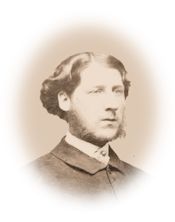April 30, Thursday. To-day has been designated for a National Fast. I listened to a patriotic Christian discourse from my pastor, Mr. Pyne.
Had a long, studied, complaining letter from Admiral Du Pont, of some twenty pages, in explanation and refutation of a letter in the Baltimore American, which criticizes and censures his conduct at Charleston. The dispatch is no credit to Du Pont, who could be better employed. He is evidently thinking much more of Du Pont than of the service or the country. I fear he can be no longer useful in his present command, and am mortified and vexed that I did not earlier detect his vanity and weakness. They have lost us the opportunity to take Charleston, which a man of more daring energy and who had not a distinguished name to nurse and take care of would have improved. All Du Pont’s letters since the 8th show that he had no heart, no confidence, no zeal in his work; that he went into the fight with a predetermined conviction it would not be a success. He is prejudiced against the monitor class of vessels, and would attribute his failure to them, but it is evident he has no taste for rough, close fighting.
Senator Sumner called on me this P.M. in relation to the coast defense of Massachusetts. I received a letter from Governor Andrew this A.M. on the same subject. The President had also been to see me in regard to it.
After disposing of that question, Sumner related an interesting conversation which he had last evening with Lord Lyons at Tassara’s, the Spanish Minister. I was an hour or two at Tassara’s party, in the early part of the evening, and observed S. and Lord L. in earnest conversation. Sumner says their whole talk was on the subject of the mails on captured vessels. He opened the subject by regretting that in the peculiar condition of our affairs, Lord Lyons should have made a demand that could not be yielded without national dishonor; said that the question was one of judicature rather than diplomacy. Lord Lyons disavowed ever having made a demand; said he was cautious and careful in all his transactions with Mr. Seward, that he made it a point to reduce all matters with Seward of a public nature to writing, that he had done so in regard to the mail of the Peterhoff, and studiously avoided any demand. He authorized Sumner, who is Chairman of Foreign Relations, to see all his letters in relation to the mails, etc., etc.
To-day Sumner saw the President and repeated to him this conversation, Lord Lyons having authorized him to do so. The President, he says, seemed astounded, and after some general conversation on the subject, said in his emphatic way, “I shall have to cut this knot.”











